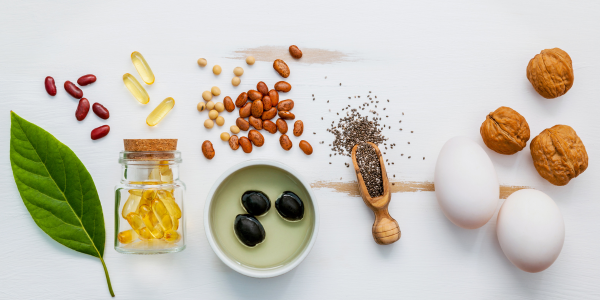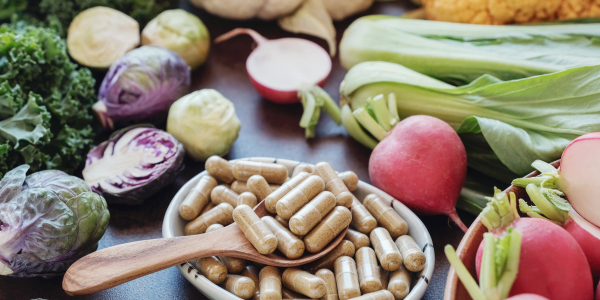There has been a notable trend in recent years: a growing awareness by consumers moving away from allopathic medicine and seeking alternative therapies and products to help boost their general health and well-being.
Whilst the allopathic route has and will always have a place, we’re beginning to truly understand that we have more control over our health than we’ve previously believed and, as such, are moving towards natural ways to lengthen our years and boost the quality of those years.
Functional medicine, including supplements, diet, and lifestyle catered to our unique biochemistry and way of life, is a trending topic, growing traction within the mainstream and for good reason1.
We’re taking a proactive approach to our health and doing the research ourselves to empower us to make healthier choices, which is fantastic.
This has led to a boost in the supplements market. However, with great choice comes great confusion for the everyday person, who is simply looking to improve their health and quality of life and make the right decisions for themselves.
Supplements, whilst powerful additions to your daily health routine, can be a minefield.
Companies' clever marketing claims and fancy packaging can add to the confusion and deter from what’s important: the quality of the supplement and how that impacts our health. This leads us nicely to debunk a few marketing supplement claims and to help provide you with clarity on a few key terms to look out for when choosing the right supplements for you.
What are Fillers, Binders, Coating and Flow Agents?
These terms are interchangeable and all work synergistically during the manufacturing process of supplements.
Fillers are essentially binders, helping to bind the ingredients together. Fillers can also be used as flow agents, helping the supplement to manoeuvre through the manufacturing process without ‘clogging’ up machines and equipment, making the process more efficient.
Fillers can also simply ‘bulk out’ the supplement and make it more appealing to the consumer.
Why Are They Used in Supplements?
There are various reasons why these ingredients are added to supplements, with the key reasons outlined below:
- They can be cheaper to produce.
- Fillers can make the supplement appear more appealing to consumers.
- Additives/coatings can make supplements taste better.
- Fillers which help bulk out the supplement can determine the consumers buying decision, influencing their reasoning by inadvertently suggesting that they are getting their ‘money’s worth’ from the product.
- Stabilisation – helps to improve durability, shelf life of the supplement and improve texture/consistency.
Can They Affect Your Health?
Studies have shown that fillers and additives can bind to the active ingredients in supplementation, impacting the absorption and bioavailability of the nutrients.
Additives and synthetic fillers and bulkers can also commonly lead to gut irritation, potentially leading to headaches, allergic reactions, and several gut symptoms including diarrhoea, abdominal pain, discomfort, and excess bloating and gas.
Not only is this inconvenient and problematic at best, but if the reaction to those additional ingredients is severe and/or chronic, it can potentially impact general gut health and lead to inflammation.
We know now all too well just how connected and integral gut health is to overall health. If our gut function is impacted, it can have a knock-on effect on:
- Wellbeing and mood, with studies linking inflammation in the gut to impaired mental health through a process known as the ‘gut-brain axis.’
- Energy, with studies linking the gut microbiota and modulation of the host’s energy balance3.
- Sleep, with gut symptoms impacting sleep quality4.
- Immunity, with the majority of our immune system residing in the gut. If the gut is impacted, then this has a negative effect on the functioning of our immune system and its ability to fight disease.
Common Ingredients to Avoid
A good rule of thumb when choosing a high-quality supplement is to read the label. UK companies are legally bound to state every ingredient included in the manufacturing process in their supplements.
Here is a list of common fillers, bulking agents, and additives to watch out for on the ingredient list:
- Magnesium Stearate – This ingredient is made up of magnesium and a saturated fat called stearic acid and is a widely used food additive. High doses of this ingredient are commonly linked to irritation of the mucus lining of the bowels leading to abdominal discomfort and diarrhoea5.
- Talc – Commonly used as an anti-caking agent, talc helps to prevent ingredients clumping in machinery during the manufacturing process. This ingredient is commonly used in cosmetics and supplements and is a subject of controversy with claims suggesting that it may be linked to an increased risk of cancer6.
- Maltodextrin – Starch is used as a filler in many supplement formulas, increasing the bulk of the capsule. A more common form of starch to watch out for on labels is maltodextrin. This ingredient has a high GI index, which makes it unsuitable for diabetics and those trying to regulate their blood sugar7.
- Titanium Dioxide – Titanium oxide is used as a colour enhancer in supplements. This ingredient has recently been removed from the European Food Safety Authority (EFSA) list of safe ingredients, marking it unsafe for consumption8.
- Silicon Dioxide – More commonly used as a preserver for active ingredients.
- Stearic Acid – A common lubricant, to help improve efficacy of the manufacturing process. Studies show that stearic acid may have a thrombotic effect when consumed in excess9.
- Propylene Glycol – Is used as a preservative and keeps the water content within a supplement low. This helps reduce the risk of contamination and product spoilage. Another term for propylene glycol is ‘antifreeze’, need I say more.
If in doubt, and if the information isn’t clear on the product or the website, then reconsider purchasing the supplement in question.
Why We're Different at Purolabs
Purolabs is a family-owned business, with the quality of their products being at the heart of their values. The founders both have a professional background within the supplements industry and noticed that the market was beginning to fill up with brands that were making unethical claims, using clever marketing and promotion tactics to sell supplements that were subpar.
This inspired them to launch Purolabs, a UK-based natural supplement company.
The founders, Adam and Marilia, had dealt with health issues themselves. Therefore, with a consumer-led focus, they wanted to provide education and awareness to the public on ‘what to look out for’ when purchasing supplements, which they have backed up through clinical research.
It was important to the founders that their products were designed and manufactured with the highest standards that reflected and backed their values.
Whilst Purolabs provides therapeutic clinical-backed doses in their supplements, stringent processes are carried out to ensure that their products are GMO-free, free of nasty fillers, additives, or artificial colorings.





















